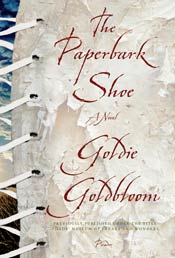
Published by Picador on March 29, 2011
I knew Gin Toad was a character I would like when, newly arrived in Wyalkatchem, she meets a woman who pats her shoulder, telling her that it's good luck to touch an albino, and Gin responds by tapping the woman and saying "Maybe it's good luck to touch an idiot." Gin doesn't often give voice to her sharp humor but she's nobody's fool, despite being committed to an institution before Toad married her. Toad can barely look at Gin and rarely touches her. Although they feel no passion for each other, she bears his children (losing one to diphtheria) while wondering whether Toad views her as just one more sheep to be bred.
Gin and Toad live on a remote farm in Western Australia. Their hard lives are made more difficult by the shortages created by World War II. Toad is ugly, coarse, uncommunicative, lacking education and refinement, yet he is fundamentally decent, possessed of a hidden depth and secrets that, like Gin's, are deeply buried. Both characters are isolated not just in their location but in their personalities. Both yearn for something they cannot have and dare not dream about.
Gin's stultifying life is transformed by two Italian prisoners of war, placed in Toad's custody as farmhands. The boisterous nature of the Italians is in sharp contrast to the withdrawn silence and studied indifference that defined Toad before their arrival, and it is inevitable that one of them awakens urges in Gin that have long been buried. At one point in the novel the Italian Antonio has to remind Gin that he is a prisoner, but he seems less a prisoner than Gin, who is imprisoned by her appearance and her past, caged by the expectations and perceptions of others. Gin's albino eyes are nearly blind in bright sunlight, but her emotional blindness is a greater disability.
The Paperbark Shoe is a remarkable novel, a multifaceted story of love and desire, war and prejudice. Townspeople are cruel to Toad because of his appearance and unschooled behavior, to Gin because of her albinism, to the Italians because of their heritage. Moments of unexpected humor keep the story's heartbreaking sorrow from becoming overwhelming. Goldbloom's sentences flow in an exquisite rhythm. Her word choice is impeccable. Each character speaks with a distinctive voice. It was clear as the novel progressed that the Italians would change the lives of Gin and Toad, but even knowing that, their lives changed in ways I didn't see coming. Although I didn't want the novel to end, the powerful ending is satisfying, rich with feeling, offering the hope of redemption as a respite from despair. Because of the story it tells, the characters it brings to life, and the beauty of its prose, this is a book I highly recommend. It apparently did well in Australia; it deserves a worldwide audience.
HIGHLY RECOMMENDED